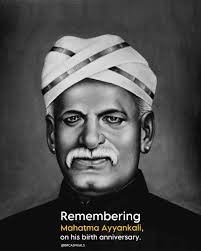Remembering Ayyankali: A Champion of Dalit Rights and Social Reform
By Amit Kumar

Today marks the birth anniversary of Mahatma Ayyankali, a pioneering social reformer, educator, and
political leader born on August 28, 1863, in Venganoor, Thiruvananthapuram, in the erstwhile
princely state of Travancore (now part of Kerala). Ayyankali was born into the Pulayar community,
one of the most oppressed Dalit castes, subjected to severe social discrimination and denied basic
human rights such as access to education, land ownership, and even entry to public roads and
temples.
Ayyankali’s early life was marked by the harsh realities of caste oppression. Despite being illiterate
himself, he became a determined voice against the caste system and the injustices faced by the
Dalits. His courageous act of riding a bullock cart on a public road forbidden for Dalits in 1893 led to
the Chaliyar riots, a year-long conflict between oppressed Dalits and upper-caste groups, highlighting
the intense social resistance to caste equality.
Recognizing education as a crucial tool for emancipation, Ayyankali founded schools for Dalit children
and persistently fought for their right to attend government schools, facing severe opposition from
upper-caste communities. His relentless agitation resulted in the 1907 Travancore government order
mandating admission for Dalit children in public schools, a landmark victory in the struggle for
educational rights.
Ayyankali was also politically active. In 1905, he founded the Sadhu Jana Paripalana Sangham
(Association for the Protection of the Poor), which aimed to uplift Dalits socially and economically,
supporting their rights to education, land, and labor. His leadership was further recognized when he
became the first Dalit member of the Sree Moolam Popular Assembly, the legislative council of
Travancore, in 1910.
One of his longstanding campaigns was for temple entry rights for Dalits, who were prohibited from
worshiping in Hindu temples. His efforts contributed to the historic Temple Entry Proclamation of
1936 issued by the Maharaja of Travancore, which abolished caste-based restrictions on temple
access.
Ayyankali passed away on June 18, 1941, but his legacy endures as a symbol of resilience and social
justice.
